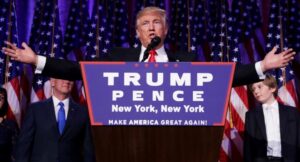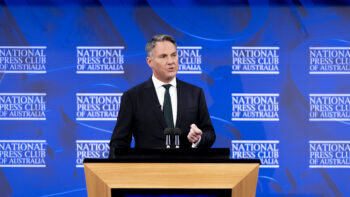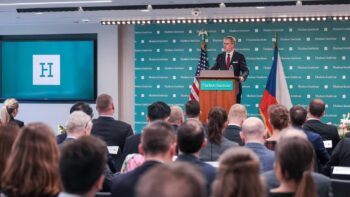
WASHINGTON: Hope for the best; prepare for the worst. It’s a standard military prescription for dealing with a sometimes hostile and usually unpredictable world. It’s also what an African-American chum told me this morning was his plan for life under President Trump.
This guy is a fellow Chicagoan and Cubs fan, so he knows how to cope with uncertainty and dashed hopes while maintaining a persistent faith and optimism — essential ingredients of the American character. It’s a good prescription, given how unexpected is the Republican Party’s powerful sweep of the White House, the Senate and the House.
How concerned are America’s allies, friends and partners with the new shape of American politics? Early this morning I got an email from a senior allied defense official offering my wife and me a spare room in their house. While gently humorous, it also speaks to the great unease among our closest international friends when faced with the surprise and shock of a Trump victory. (OK, no snide remarks about how yet another member of the media missed support for Trump. Few Americans, including Trump supporters, expected him to win — let alone win the trifecta — though they hoped mightily. I had told friends for days that Trump had a real chance of winning, though I did think it unlikely.)
Our NATO allies, whom Trump has repeatedly and markedly disparaged, will be watching every word coming out of the president-elect’s mouth until Jan. 20, when he takes office.
Angela Merkel, leader of the most powerful country in Europe, made clear today she is watching President-elect Trump with a gimlet eye. While noting that Germany’s relationship with the US is “a foundation of German foreign policy,” Merkel added this important caveat in Berlin. She noted both countries share values of “democracy, freedom, the respect for the law and the dignity of human beings, independent of their origin, skin color, religion, gender, sexual orientation or political position.” And she made clear her cooperation with the next administration would be dependent on it hewing to those values. “On the basis of these values I offer the future president of the United States, Donald Trump, close cooperation.”
Some international observers were delighted with a Trump victory. Members of Russia’s parliament burst into applause when informed of the result. Putin issued a statement saying he hoped he and Trump could “work together” to improve Russian-American relations “from their crisis state.”
On what basis does Putin expect things to improve? It will be “based on principles of equality, mutual respect and a real accounting of each other’s positions, in the interests of our peoples and the world community”. Given Putin’s behavior over the last five years, that would seem to mean Trump will largely do what the Russian president wants — not really the best course for the leader of a much more powerful economy and military with lots of close allies with Russian borders. But one of the primary tests for Trump will be just how he manages such relations. Is he really an isolationist whose first instinct will be to do nothing? It’s very hard to tell.
One factor that world leaders will take into account is that, while Trump won the all-important Electoral College vote, he did not sweep into power with a powerful popular mandate. As of 9 am this morning, Hillary Clinton had won the popular vote by a tiny 135,000 votes with 98 percent of the vote counted. You can be sure that diplomatic cables and intelligence assessments going out this week will all note this.
Republicans retained the House and Senate, seeming on the face of it to add to Trump’s political capital. However, many of those Republicans, such as Sen. Marco Rubio, did better than did Trump in their home states, seeming to indicate that they won on their own. Some commentators have claimed that the Republican Party may have succeeded in turning out much larger numbers of voters than expected, but that’s very hard to tell at this point. The real issue here is one of perspective. Democrats had been expected to gain control of the Senate, or come darn close.
For Pentagon watchers, one key issue over the seven weeks until Christmas is who will Trump pick to lead the military.

Sen. Jeff Sessions
We’ve got some early names. For the crucial job of Defense Secretary, early front runners are Sens. Jeff Sessions and Tom Cotton, as well as former Sen. Jim Talent, a member of the US-China Economic and Security Review Commission and an expert at the conservative Heritage Foundation.
While former DIA Director Michael Flynn has been front and center advising Trump on national security issues throughout the campaign, he is not a likely choice for SecDef given his status as a retired general. “Flynn is probably not Senate-confirmable,” Mackenzie Eaglen, defense expert at the conservative American Enterprise Institute, says. “He’s likely eyeing a job like National Security Adviser or something.” The NSA, while a potentially important job, depends heavily on the personality of the holder and does not require Senate confirmation.
Outgoing Rep. Randy Forbes, chairman of the House Armed Services seapower and power projection subcommittee, is rumored to be a likely pick for Navy Secretary. Forbes comes from a Virginia district with lots of Navy interests and has provided close oversight of the Navy and Marines. Also, former Rep. Mike Rogers is apparently in the mix for a Trump job, but my sources are not sure for what post. Given his role as former chair of the House Permanent Select Committee on Intelligence (HPSCI), a top job in the Intelligence Community makes sense.

Rep. Randy Forbes
One of the more interesting aspects of the trifecta sweep of White House, Senate and House is that it appears to be good tidings for the defense industry. Shares of Lockheed Martin and Northrop Grumman were up at least 5 percent this morning. Raytheon was up 7.6 percent while the overall stock market doodled along in slightly positive territory. In Europe, BAE Systems, Cobham and French defense company Thales rose substantially.
Defense consultant Loren Thompson, with very close to most of the American defense primes, penned a column this morning saying that the trifecta signaled “happy days are here again” for the industry.
“Surges in weapons spending usually require Republican control of the White House and Senate, which is what Washington will now have,” Thompson said in a piece for Forbes.com. As Breaking D readers know, Trump has called for modernizing the weapons and delivery systems of the nuclear triad, building toward a 350-ship Navy, increasing the Air Force’s active fighter inventory to 1,200 and boosting the Marine Corps from 27 to 36 battalions. Mark Cancian of the Center for Strategic and International Studies estimated for us that Trump’s defense plan may cost $60 billion more than President Obama’s proposed Future Years Defense Plan.
Textron, Leonardo bank on M-346 global experience in looming race for Navy trainer
“The strength we think we bring is that [the Navy is] going to go from contract to actually starting to turn out students much quicker than any other competitors,” a Textron executive told Breaking Defense.



























